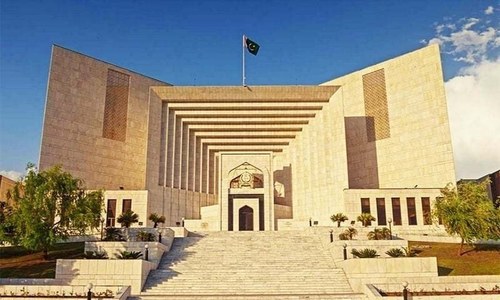
ROEDAD Khan, a veteran bureaucrat who witnessed history from multiple perches and served several rulers — from General Ayub Khan to Nawaz Sharif — passed away on Sunday at the age of 101.
Born in Mardan in pre-partition India, Mr Khan had celebrated his 100th birthday on September 23, last year. His passing was announced by prominent politician and relative, Mushahid Hussain Sayed.
“He lived a full life of service to Pakistan during our most tumultuous period plus post retirement: pioneered Environmental Protection for Islamabad, authored books and became bold activist for democracy and human rights! Truly a unique, multifaceted personality of our times! He will be missed by his countless admirers!” he posted on X.
Mr Khan is survived by five sons and a daughter. He was laid to rest at the H-11 graveyard, and his funeral was attended by a number of prominent individuals, including Afrasiab Khattak, Wasim Sajjad, Raja Zafarul Haq, Ashraf Jehangir Qazi, Riaz Muhammad Khan, Faisal Javed and others.
A storied career
An alumnus of Lahore’s Forman Christian (FC) College and the Aligarh Muslim University, Mr Khan joined the Pakistan Administrative Service in 1949.
In the Ayub Khan-era, he served as deputy commissioner in Peshawar and was later the commissioner of Karachi from 1963 to 1965, around the time the capital was being shifted to Islamabad.
Mr Khan served as the head of Pakistan Television during the historic 1970 election under Yahya Khan. Then, under Zulfikar Ali Bhutto, he served as the federal secretary of tourism department. Under General Ziaul Haq, he became the federal interior secretary between 1978 and 1988.
When that tenure came to an end, Mr Khan was appointed secretary general of the interior ministry by his friend and long-time colleague, Ghulam Ishaq Khan. When he finally quit the civil service, Roedad Khan was immediately appointed the minister of accountability during Prime Minister Nawaz Sharif’s first tenure in power, in 1990.
But Mr Khan did not dwell much on the controversial subjects of civil-military relations, the abuse of power by bureaucracy and corruption within its ranks. His book, A Dream Gone Sour, as the title suggests, was about wasted opportunities that Pakistan could have availed to prosper as a peaceful country.
He blamed “adventurous military rulers and insecure politicians such as Zulfikar Ali Bhutto” but was quick to defend any real or imagined role he had. “I was in civil service. I had to serve. I didn’t do anything wrong,” he insisted in an interview with the Herald in 2014.
It was also claimed that he was the man who signed Z.A. Bhutto’s execution order — in his capacity as interior secretary — but he disputed the claim. “I never signed the execution order. The Central Jail Rawalpindi comes under the home secretary of Punjab, not the federal interior secretary… The black warrant came from Lahore,” he told the Herald in 2014.
Life after retirement
But even after his retirement, the storied bureaucrat continued to be an active member of civil society.
According to Mushahid Hussain, Mr Khan joined the ANP for some time after his retirement. At the time, his brother Abdul Khaliq Khan was the number two man in the party.
Mr Hussain recalled how, in 1988, both he (in his capacity as journalist) and Roedad Khan (as a member of ANP) attended the funeral of Khan Abdul Ghaffar Khan — popularly known as Bacha Khan — in Jalalabad.
Roedad Khan had joined the PTI around five years ago.
“He was the founding president of Margalla Hills Society and filed a case in the Supreme Court against the proposed tunnel in Margalla Hills, which he won. He also played an active role in the movement for the restoration of the judiciary in 2007,” Mushahid Hussain told Dawn.
Mr Hussain also recalled the ‘Saturday Club’, which saw retired generals, judges, bureaucrats, diplomats and other prominent personalities congregating at Mr Khan’s residence to talk about all things under the sun.
Writing for the Herald in 2015, Aurangzaib Khan described one such meeting thus: “The sunlight winks through the soaring pine-heads in a street off Islamabad’s Margalla Road. Inside, a select group of mandarins, former bureaucrats, retired diplomats, ex-judges is engaged in a heated discussion on current affairs.”
“All eyes are set on Roedad Khan, who seems like a ghost from the past — gaunt, frail and yet imposing in his warm tweed jacket… He raises and moves his thin index finger to moderate the discussion. There is no agenda, he says of the gathering that takes place with clockwork regularity at his home, ‘just people with enormous experience and background letting their hair down.’
Reporters still muse how they would even get story tips from those gatherings.
Published in Dawn, April 22nd, 2024














































Dear visitor, the comments section is undergoing an overhaul and will return soon.